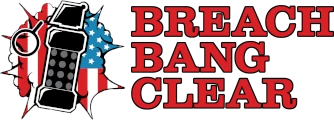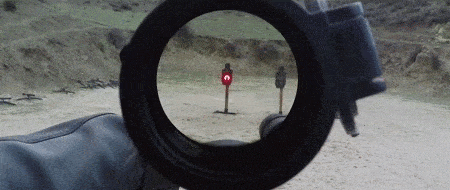There’s a weird sort of determinism running through the talk about veterans, warriors, and even law enforcement these days. Most of the blame can probably be placed on David Grossman, a non-combat psychologist who put forth, along with a lot of other well-received but ultimately flawed studies (mostly based on the discredited work of SLA Marshall), the model of “Sheep, Wolves, and Sheepdogs.” This model has been embraced by real professionals and overweight wannabes alike.
Grossman and others say there are some people who are simply sheep: passive and gentle creatures who are incapable of hurting anyone or conceiving of hurting anyone. Others are wolves: remorseless predators who kill and rob the sheep with impunity. And the third category is the sheepdogs: soldiers, police, etc., men who are capable of the wolves’ violence but with the honor to protect the sheep instead of prey upon them.
The first problem with this analogy is that it falls apart under scrutiny. People aren’t sheep, wolves, or dogs. They’re people. The aforementioned animals act out of instinct, not reason. A sheep is a placid herbivore because that’s its nature. Same with the wolf. The dog has been carefully bred and trained for generations for a particular task, and behavior akin to it can often be observed in certain breeds even without training (for instance, Huskies are known to want to run, as they are bred to be working dogs, running and pulling sleds).
While I have had people argue on this point that people are really just animals as well, as driven by instinct and impulse as the unreasoning animals described, that again falls apart under scrutiny. A man makes decisions, however flawed. He can change his moral course. He can learn, and he can refuse to learn. For example, look at one of the greatest American warriors: Alvin York.
Alvin York grew up poor, relatively uneducated, became a brawler and hard drinker, and was generally considered a local nuisance at best. Following the killing of his best friend, Everett Delk, in a bar fight, York had a religious conversion and joined the Church of Christ in Christian Union, which forbade drinking, dancing, swearing, swimming, movies, popular literature, and had very strict words against violence and war. When he was drafted in 1917 he applied as a Conscientious Objector, writing on his draft card, “Don’t want to fight.” Since the Church of Christ in Christian Union wasn’t recognized as mainstream Christian his request was denied, and he was sent to France with the 328th Infantry.
Need ammunition? #backthebang
⚠️ Some hyperlinks in this article may contain affiliate links. If you use them to make a purchase, we will receive a small commission at no additional cost to you. It’s just one way to Back the Bang.
Once in France, York’s company commander was able to convince him, though, with difficulty, that war is sometimes justified, and York reluctantly agreed to fight when needed. In the Argonne forest in October 1918, York and his sixteen comrades were able, with the help of York’s excellent marksmanship, to silence a machine gun nest and capture 132 German soldiers, though they lost eight men in the process. York was awarded the Medal of Honor for the exploit, though he was never proud of what he had done. He considered the killing nothing more than a necessary evil, but an evil nonetheless.
So if one goes by the Grossman analogy, York was a wolf, if a poor one, became a sheep, and then became a sheepdog. If these are “just what people are,” as Grossman says in the original “Of Sheep, Wolves, and Sheepdogs,” then that shouldn’t happen. But York, just like any other man, wasn’t a sheep, or a wolf, or a dog. He was a man who made decisions and acted upon them.
But what about people who are just weaker than others? I’ve heard from more than one person, when hearing about what we did in training, “Oh, I could never do that.” Bullshit. If Theodore Roosevelt, a scrawny, sickly asthmatic, could turn himself into the poster child for “the vigorous life,” then the only thing keeping any other man from the basic fitness of a warrior is his own will. Are there genetic differences that will keep some from reaching the peaks of others? Of course. But no one who truly sets out to become strong just stays weak. That is cowardice and sloth talking.
Largely thanks to this extremely flawed “Sheep, Wolves and Sheepdogs” analogy, a certain toxic combination of arrogance, wishful thinking, and laziness has taken over the wider thought processes about what a warrior is. A warrior is a man trained for battle. That’s it. There is nothing inherently special about him. Skill, strength, endurance, and discipline are learned. Stop thinking that because you learned them that you are better than others, or that because you don’t want to learn them, that “well, that’s just the way you are.”
No excuses.
This article may contain affiliate links. If you make a purchase using such a link, we will earn a small commission from that sale at no additional cost to you.












Grew up a brat and served throughout duration of Vietnam
war + as a Navy line officer
Although I did not serve in combat, but instead in support roles e.g. comm, intel & aviation related, my experience during the years of active duty lead me to believe that some are and some are not
No matter how much time they spend in training some are
unable and it is immediately apparent.
I will never forget how those who had served under my father
(30 years USN/MSC and an additional 8 years as an adviser in I Corps) said
“His leadership is such that I would follow him into Hell if called on to do so”
One told me his success in the Navy was due to dad’s mentoring when we were stationed at Hdqtrs Support Activity Taipei…Others had served with him in Vietnam..and told me later.
I was a combat infantryman prior to being a cop for a period back in the late 20th & early 21st centuries. I found a Grossman seminar informative and thought provoking. It seemed especially appropriate and well received by the younger officers in attendance who had little worldly experience and needed some context to help develop their professional persona. I found LtC Grossman himself to be intelligent, personable and quite professional. It is small of anyone to bad mouth him because he was not a combat officer. Do I subscribe to the entirety of his positions and presentations? Of course not. But I will not demean the man for trying to make the professional life of LEOs a little more manageable and perhaps survivable. I also appreciate his books about child violence in our culture. I think David Grossman a good man making an honest effort to improve the lives of first responders.
What needs more exploration is where the desire or want to become a warrior or in my case, a firefighter. When I was younger I was told by senior guys I was a good fireman.
And as I advanced thru my training and experiences on small and large fires I realized I was pretty good at doing the job.
But what drove me in particular and people in general to do unnatural things and risk life and limb?
Running into a burning building is not a natural thing. Neither is learning to suppress your gag reflex when your covered in shit and vomit while your trying to save someone’s life.
So where does this want come from? Because I have had plenty of people tell me they could not do my job. I think no less of them for saying that because they do not have the desire. So why do we become the warrior or protector?
Grossman never went to combat, yet he crafted “killology,” a discipline recognized by nobody, and definitely not by any academic authority.
How many times in a lecture does Grossman say “hooah?” Grossman wears a Ranger tab everywhere that he goes, but Grossman never served in a Ranger Battalion or in the Ranger Regiment.
Grossman graduated from Ranger School, which during his era was 58 days long and intended to teach small unit leadership to 2d LT graduates of the Infantry School.
It is a difficult course, as any PFC from a Ranger Battalion will tell you, because that is when Ranger Battalions send their PFCs to Ranger School. When they are PFCs. Anyone who attends Ranger School will tell you that you want one of those PFCs as your Ranger Buddy.
So “Ranger” Dave Grossman, and he will tell you that he is a Ranger, just give him 30 seconds, has no experience in an actual Ranger unit, and he never went to combat, yet he writes books about killing.
Grossman does have an academic background, and he did teach at West Point. This may be partly why Grossman is so clueless, as he long taught in a hermetic bell jar where everyone says “hooah” and cadets idealize Rangers and Ranger tabs and they are indoctrinated to worship rank.
For someone who writes a theory of psychological theory, you would expect that theory to have some academic foundation and to receive academic scrutiny. Real academics laugh about Grossman and “killology.”
I will leave it with this: I tried to read Grossman’s books, but I found them all unreadable. I pity the junior officers trying to slog their way through the Commandant’s Reading List, and I wonder what moron put any of Grossman’s works on there. Grossman makes no contributions to psychology, Grossman has no special operations experience, no combat experience, and Grossman never killed a man.
But he sure can persuade cops that they are “warriors,” and that they are at war, which makes we the people the enemy, I guess. Militarization of police is an idea that no longer looks so smart, when you examine the consequences.
I just shake my head every time that I meet a cop who attended one of Grossman’s presentations. They could spend unit training funds on much better lecturers than Grossman.
About three years ago I sat through one of Dave Grossman’s classes. As a former Green Beret who is now a cop, I enjoyed the class, even earned a book from Grossman for being able to answer a question Grossman had. I have never understood or agreed with the “sheepdog concept”.